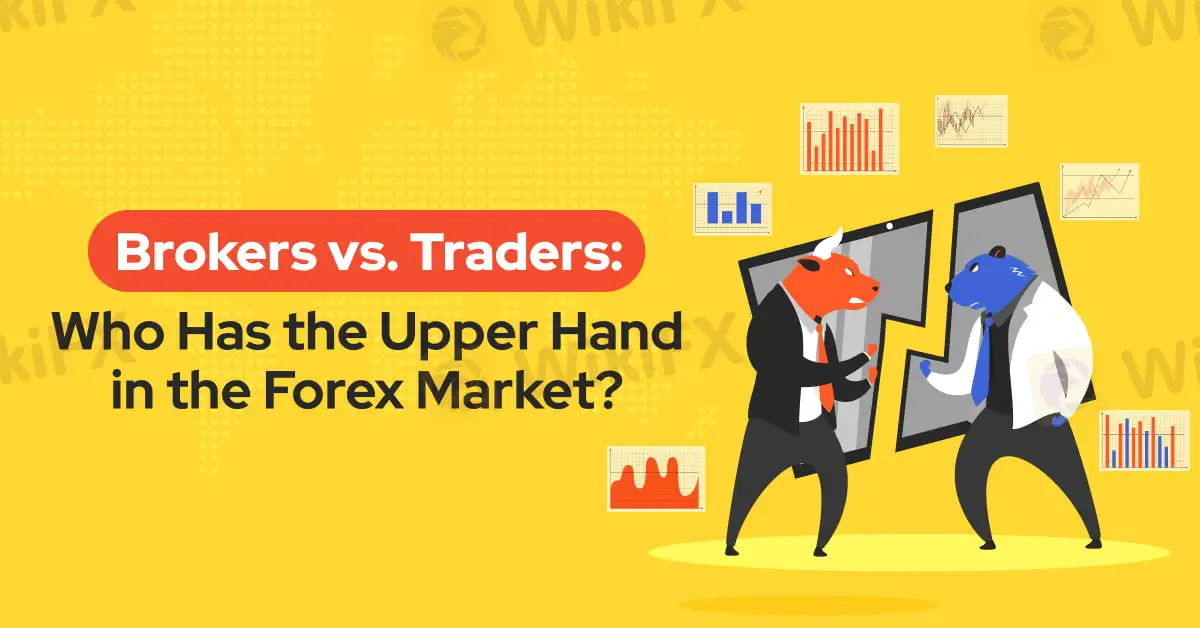简体中文
繁體中文
English
Pусский
日本語
ภาษาไทย
Tiếng Việt
Bahasa Indonesia
Español
हिन्दी
Filippiiniläinen
Français
Deutsch
Português
Türkçe
한국어
العربية
Brokers vs. Traders: Who Has the Upper Hand in the Forex Market?
Abstract:The relationship between brokers and traders is intricate. Both sides play pivotal roles in driving the multi-trillion-dollar foreign exchange market, but the question remains: who holds the upper hand? To answer this, it’s crucial to understand the roles they play, the advantages each side possesses, and how these factors shape their position in the market.

In the dynamic world of forex trading, the relationship between brokers and traders is intricate. Both sides play pivotal roles in driving the multi-trillion-dollar foreign exchange market, but the question remains: who holds the upper hand? To answer this, its crucial to understand the roles they play, the advantages each side possesses, and how these factors shape their position in the market.

Brokers are intermediaries who facilitate forex trading by providing traders access to the market. They offer trading platforms, liquidity, and often key market insights. In return, they charge traders fees such as spreads or commissions, and some brokers profit from traders' losses through dealing desk models. Brokers' primary goal is to maintain liquidity and ensure smooth trading for their clients.
Traders, on the other hand, are individuals or institutions that buy and sell currency pairs, aiming to profit from the fluctuations in exchange rates. Their success largely depends on their ability to interpret market conditions, technical analysis, and sometimes even gut feelings. The traders objective is straightforward—capitalize on market movements to turn a profit.
When considering who has the upper hand, brokers have certain structural advantages. First, they are market facilitators, meaning they benefit from trading volume rather than needing to predict price movements accurately. Whether traders win or lose, brokers earn through spreads and commissions. This creates a relatively stable revenue stream compared to the high-risk environment traders face.
Secondly, many brokers have access to real-time market data and advanced trading algorithms, giving them a technological edge. They can offer traders access to fast execution speeds, but they themselves are often backed by institutional-level tools that provide deeper insights into market trends. For brokers using a dealing desk model, they can hedge against traders or even take the opposite side of their trades, further reducing their risk.
Lastly, brokers operate with a broader understanding of market behaviour, often through the lens of aggregated trader data. By observing common trader behaviours, such as when retail traders typically enter or exit the market, brokers can anticipate market moves, positioning themselves strategically.
On the other hand, traders, especially retail traders, often start with the odds stacked against them. They face not only the complexity of the forex market but also the inherent risk that comes with trading on margin. While some traders possess extensive knowledge, many lack the institutional-level resources that brokers have at their disposal.
The emotional aspect also plays a significant role. Traders may be influenced by fear or greed, which can lead to poor decision-making. Brokers, being on the other side, remain largely immune to these emotional pitfalls. Even experienced traders must contend with the reality that they are competing against institutional traders, algorithms, and even brokers themselves.
Despite these challenges, traders are not without their own advantages. One key factor in favour of traders is flexibility. Traders can quickly adapt to market changes, altering strategies as needed. Brokers, with their more rigid structures and regulatory obligations, do not have the same agility when it comes to taking positions in the market.
Additionally, successful traders often thrive by specializing in certain currency pairs or market conditions. They can capitalize on specific opportunities that might go unnoticed by brokers focused on the broader market. This specialized knowledge, when combined with skill and experience, can give traders an edge, particularly in volatile or niche markets.
So, who holds the upper hand in the forex market—brokers or traders? The answer is not clear-cut. Brokers certainly benefit from structural advantages such as lower risk, stable revenue models, and access to institutional-level tools. However, skilled traders who can manage their emotions, adapt to market conditions, and utilize deep market knowledge can still outperform.
In the end, the battle between brokers and traders comes down to experience, strategy, and understanding the market. For traders, success often depends on the ability to outthink and outmanoeuvre both the market and the brokers facilitating their trades.

Disclaimer:
The views in this article only represent the author's personal views, and do not constitute investment advice on this platform. This platform does not guarantee the accuracy, completeness and timeliness of the information in the article, and will not be liable for any loss caused by the use of or reliance on the information in the article.
Read more

Never Heard of Dynasty Trade? Here's Why You Should Be Worried
Have you heard this name before? No , it’s time you do because staying unaware could cost you. This platform is currently active in the forex trading and has been linked to several suspicious activities. Even if you’ve never dealt with it directly, there’s a chance it could reach out to you through ads, calls, messages, or social media. That’s why it’s important to know the red flags in advance.

Want to Deposit in the EVM Prime Platform? Stop Before You Lose It ALL
Contemplating forex investments in the EVM Prime platform? Think again! We empathize with those who have been bearing losses after losses with EVM Prime. We don't want you to be its next victim. Read this story that has investor complaints about EVM Prime.

WEEKLY SCAM BROKERS LIST IS OUT! Check it now
If you missed this week's fraud brokers list and are finding it difficult to track them one by one — don’t worry! We’ve brought together all the scam brokers you need to avoid, all in one place. Check this list now to stay alert and protect yourself from fraudulent brokers.

Catch the Latest Update on BotBro & Lavish Chaudhary
BotBro, an AI-based trading platform, became popular in India in 2024—but for negative reasons. Its founder, Lavish Chaudhary, who gained a huge following by promoting it heavily on social media. Since then, he has become well-known, but for many controversies. Let’s know the latest update about Botbro & Lavish Chaudhary.
WikiFX Broker
Latest News
Olymptrade Under Fire – Fraud Allegations and Investor Outrage
Hantec Markets Appoints New Executives for Growth in Dubai
Is the Forex Bonus a Genuine Perk or Just a Gimmick?
OctaFX Was Fined $37,000 for Operating Without a License
What Role do signals play in the forex trading?
5 Reasons Why Traders Are Losing Trust in Headway Broker
What WikiFX Found When It Looked Into Vestrado
Hantec Financial: A Closer Look at Its Licenses
eToro Joins Hands with Premiership Women’s Rugby
RM750 Million Lost to Investment Scams in Just Six Months
Currency Calculator


